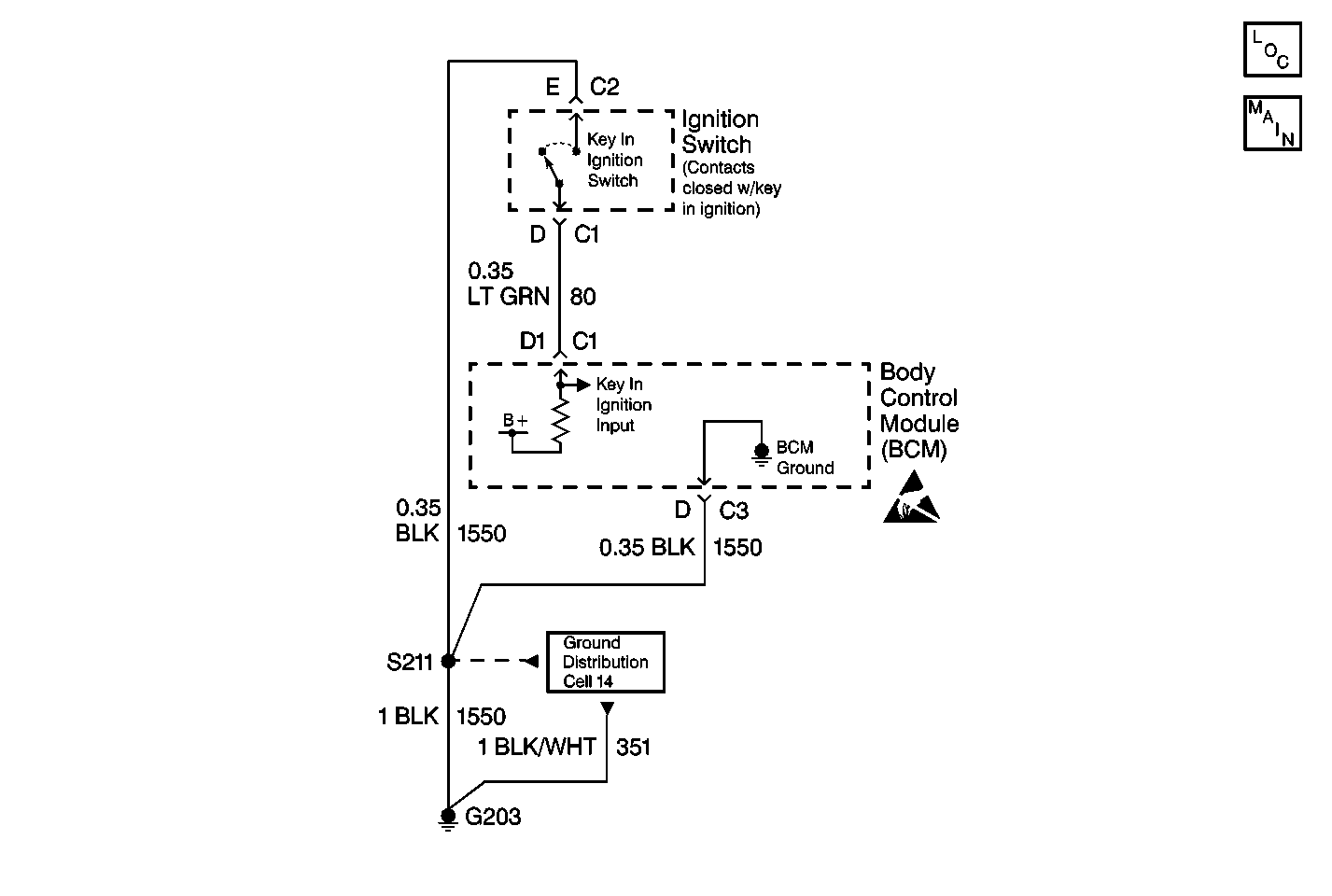
Circuit Description
The BCM interfaces with the key in ignition switch. The key in ignition switch grounds circuit 80 when the key is fully inserted in the ignition switch. The key in ignition switch opens when key is removed from the ignition switch. The BCM uses this input for the operation of the key in the ignition reminder, exit illumination, and lockout prevention. The key in ignition switch receives ground through circuit 1550.
Conditions for Setting the DTC
- The BCM does not detect a ground signal in circuit 80 when the BCM is detecting voltage in circuit 1500.
- All conditions must be present for more than 0.3 seconds.
Action Taken When the DTC Sets
The BCM stores DTC B2739 in memory.
Conditions for Clearing the DTC
| • | The BCM receives a key in ground signal (circuit 80) when the ignition switch is not off, then the BCM changes the DTC status from current to history. |
| • | A history DTC will clear after 100 consecutive ignition cycles if the condition for the fault is no longer present. |
| • | Using a scan tool. |
Diagnostic Aids
| • | The following conditions may cause an intermittent malfunction to occur: |
| • | An intermittent open or short to ground in circuit 80. |
| • | An intermittent open in circuit 1550. |
| • | Poor connections at the BCM or the key in ignition switch. |
| • | An intermittent open in G203. |
| • | Faulty ignition switch. |
| • | The BCM is open internally. |
| • | DTC P1626 will set in the Powertrain Control Module (PCM) when the ignition switch is on with the Body Control Module (BCM) disconnected. When BCM diagnostics and repairs are completed, refer to Powertrain On Board Diagnostic (OBD) System Check (LX5) or Powertrain On Board Diagnostic (OBD) System Check (L36) in Engine Controls for additional information on PCM related DTCs. |
Test Description
The numbers below refer to the step numbers on the diagnostic table.
-
This step determines whether circuit 80 or 1550 is open, or the ignition key alarm switch is faulty (contacts always open).
-
This step checks for either short to ground in circuit 80 or a faulty ignition key alarm switch (contacts always closed).
-
This step determines whether the malfunction is intermittent or the BCM is faulty.
-
This step checks for an open in circuit 1550.
-
This step checks for either an open in circuit 80 or a faulty ignition key alarm switch.
-
This step checks for either a short to ground in circuit 80 or a faulty ignition key alarm switch.
Step | Action | Value(s) | Yes | No |
|---|---|---|---|---|
1 | Was the BCM Diagnostic System Check performed? | -- | ||
2 | Check for BCM current DTCs. Refer to Diagnostic Trouble Code (DTC) Displaying for more information. Is BCM DTC B0608 also set as a current DTC? | -- | ||
Is the resistance measured within the specified range? | Less than 50ohms | |||
4 |
Is the resistance measured within the specified range? | ∞ | ||
Does DTC B2739 reset as a current DTC? | -- | |||
Is the test lamp on? | -- | |||
Using a DMM, measure the resistance between the BCM harness connector C1 terminal D1 and the ignition switch harness connector C1 terminal D. Is the resistance measured within the specified range? | Less than 2ohms | |||
Is the resistance measured within the specified range? | ∞ | |||
9 | Repair poor connection or open in circuit 1550. Is the repair complete? | -- | -- | |
10 | Replace the ignition switch. Refer to Ignition and Start Switch Replacement in Instrument Panel, Gauges and Console for service procedures. Is the repair complete? | -- | -- | |
11 | Repair poor connection or open in circuit 80. Is the repair complete? | -- | -- | |
12 | Repair short to ground in circuit 80. Is the repair complete? | -- | -- | |
13 |
Is the repair complete? | -- | -- | |
14 | The malfunction is not present at this time. Refer to Diagnostic Aids for additional information regarding this DTC. | -- | -- | -- |
15 |
Are there any BCM current DTCs set? | -- | System OK |
